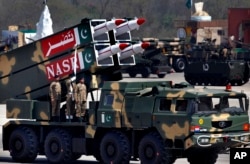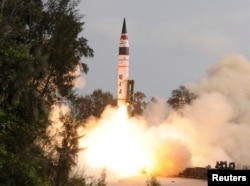Pakistan’s top nuclear security advisor has rejected growing U.S. pressure and safety concerns about its production and deployment of battlefield nuclear weapons.
“We are not apologetic about the development of the TNWs [tactical nuclear weapons] and they are here to stay,” said Khalid Ahmed Kidwai, an advisor to the so-called National Command Authority (NCA) and a longtime custodian of the country’s nuclear arsenal.
The institutions responsible for planning storage and operational deployments do make sure that “it is so balanced on ground in time and space that it is ready to react at the point where it must react and at the same time it is not sucked into the battle too early and remains safe," Kidwai told a seminar at Islamabad’s Institute of Strategic Studies.
Response to US
He was apparently responding to last week’s testimony before the U.S. Senate Foreign Relations Committee by Undersecretary of State for Arms Control and International Security Rose Gottemoeller, where she praised the “excellent” steps Pakistan has undertaken to secure its nuclear arsenal, but said Washington is troubled by the development of battlefield nuclear weapons.
She insisted that battlefield nuclear weapons, by their very nature, pose security threats because their security cannot be guaranteed when they are taken to the field.
“So, we are really quite concerned about this and we have made our concerns known and we will continue to press them about what we consider to be the destabilizing aspects of their battlefield nuclear weapons program,” Gottemoeller said.
Nuclear Security Summit
The tensions come ahead of next week’s Nuclear Security Summit in Washington (March 31 - April 1), where President Barack Obama and other global leaders will discuss terrorism threats related to radiological weapons and review proposed safety measures. Leaders of Pakistan and its nuclear-armed archival India will also attend.
Islamabad’s tactical nuclear weapons have been straining its traditionally rollercoaster ties with Washington since 2011, when Pakistan first tested and began producing its nuclear-capable "Nasr" ballistic missile, which has a range of 60 kilometers (36 miles).
Pakistani officials justify their development of tactical nuclear weapons by citing India’s so-called "Cold Start" doctrine, which they say is aimed at undertaking a quick, punitive, conventional military strike inside Pakistan.
While Pakistan’s long-range ballistic missiles can hit anywhere in India, Kidwai insisted the tactical nuclear weapons have been developed to keep the neighboring country’s conventionally huge military from imposing a limited conflict on his country for achieving “political objectives.”
“It compelled us to plug the gap that existed at the tactical level within the nuclear system,” the Pakistani advisor asserted. He reiterated Islamabad’s “full spectrum” nuclear weapons program is “India-specific” and described the neighboring country as “Pakistan’s only enemy.”
Pakistan-India rivalry
He criticized decades of U.S.-led international moves to penalize Pakistan for developing the nuclear program while “ignoring” Indian advancements.
Kidwai insisted that the punitive actions might have caused political and diplomatic setbacks to his country but said it has not impacted its efforts to defend the country against another Indian aggression.
“Pakistan would not cap or curb its nuclear weapons program or accept any restrictions. All attempts in this regard… are bound to end up nowhere,” he added.
The Pakistani advisor particularly criticized the American media for being "completely negative, hostile and biased" towards Islamabad's nuclear program, accusing it of publishing misleading reports and claims that Pakistan possesses the world's fastest growing nuclear program.
"I think it is politically-motivated because the developments that are taking place in Pakistan are of a very modest level, very much in line with the concept of credible minimum deterrence, and they are always a reaction to an action that takes place in India. So, Pakistan does not have the fastest growing nuclear program," he said.







